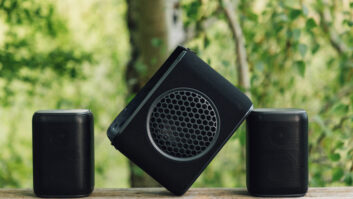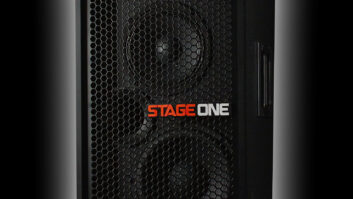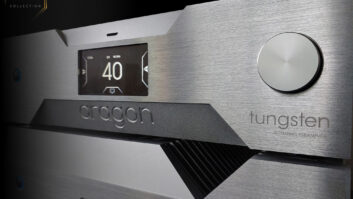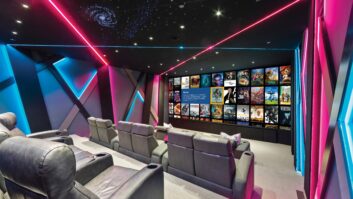New York – Philips revamped its headphone MP3 player selection, launched its first portable media player (PMP), and continued to take audio systems in new directions with the launch of its 2006 lineup here.
During a line showing to the press, Philips unveiled five new MP3 portables, four with an “anti-iPod” black finish and touchpad with blue-backlit icons. The design first appeared last October on a 30GB portable that continues at an everyday $279. The selection includes two 8GB HDD models at an everyday $249 and $199, a $149 1GB flash-memory model, a 1GB USB-slider model at $99, and the company’s first 2GB flash model, which retails for $199.
All new models record via their microphone input in MP3 format from any music source, dramatically expanding the selection of MP3 portables with that capability. The five new models, which are PlaysForSure compatible, play MP3 and protected WMA files, charge via USB, and display photos, increasing the selection of models with picture viewer.
The company’s first PMP will be based on the Microsoft Portable Media Center (PMC) platform, but unlike most PMCs, the 30GB PMC7230 will also record directly off a TV, set-top box, DVR or DVD player via analog inputs. It uses Macrovision technology to block recording of prerecorded VHS and DVD movies. The $349-everyday device, due in September, will also be compatible with Vongo-service video downloads and with future video downloads that can be transferred to PMCs from the MovieLink and CinemaNow download services, said Wieger Deknatel, marketing director for premier entertainment solutions. It encodes in MPEG-4 when recording from home video sources.
In audio systems, the company showed more flat audio systems for use with flat-screen TVs and its first two home audio systems packaged with a docking/recharging station for all new Philips’s MP3 players and a separate docking station for iPods. They’re the $129-everyday MCM275D and $99 MCM118D microsystems.
The included docking stations, packaged with a remote, connect to the systems via an analog-audio cable to reproduce music through the connected audio systems. The docking station is also available separately at $39 without remote and $49 with remote. Last year in docking stations, a docking station for a specific Philips model was available only through limited distribution.
Also in audio systems, the company showed its first five DVD-equipped music systems, which Philips calls “micro theaters” because the one- and two-chassis microcomponent systems are intended for home theater use in bedrooms and other small rooms where small size and only two speakers make sense. They’re available and priced from an everyday $149 to $249, some with subwoofer, some without.
The company also demonstrated its first amBX PC-gaming speaker system that, like a Philips Ambilight flat-screen TV, generates a soft light that matches the predominant on-screen color. When the 2.1 speaker systems are used with about 10-15 specially encoded PC gaming titles due from third parties at launch in November, included fans will generate wind, and a wrist-wrest “rumble strip” will vibrate, in coordination with the on-screen action.
The system will retail for $329 with all features. A version without fans and rumble strip will be $249, and a lights-only system for use with existing speaker systems will be $149. Philips wasn’t kidding that down the road expect systems with a water spritzer and a smell generator.
In networked audio, Philips unveiled a lower priced HDD-equipped wireless music server, the 80GB WACS4500. It’s due in October at $499. It connects to any stereo system and can stream music wirelessly to optional $129 clients, which must also be connected to a stereo system.
The WACS 4500 joins the $899 WACS57 system, which bundles a server and client with built-in amplifier and speakers, and the WACS700 shelf system with wireless HDD server.
In another development, all network-audio products have been upgraded to store and play protected WMA files, including subscription downloads, the company said.
In 2007, Philips plans satellite-radio-ready home and portable audio products, said senior sales and marketing VP Scott Levitan. He didn’t disclose the satellite broadcaster or broadcasters that Philips would partner with.
Philips also showed select products that debuted at CES, including the $399 SonoWave virtual surround system that delivers 5.1-channel surround through 2.1-speaker system. It is Philips’ first such system.













